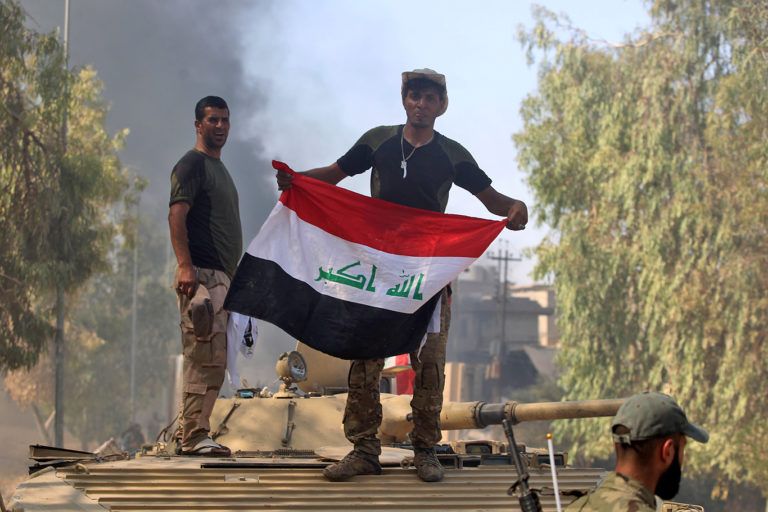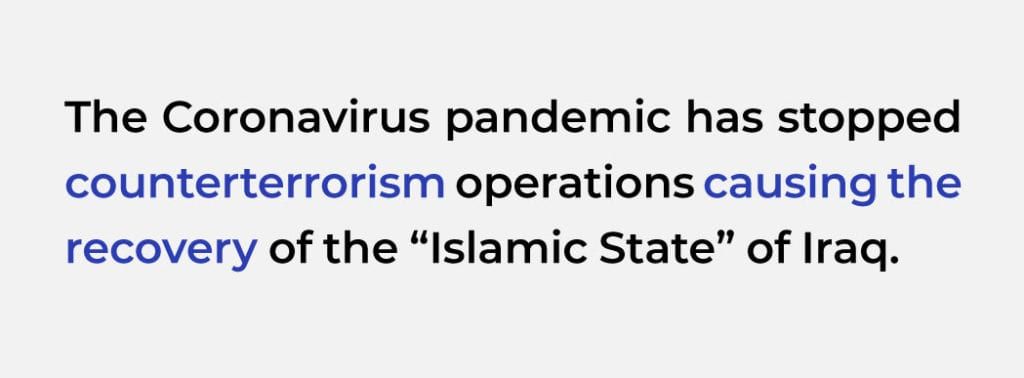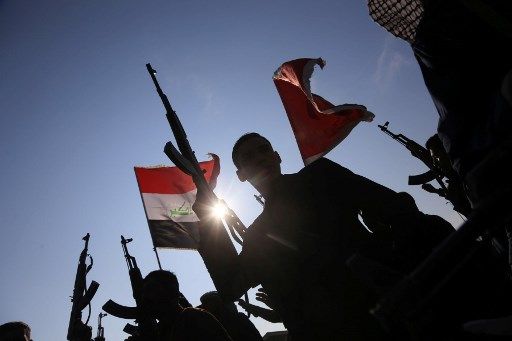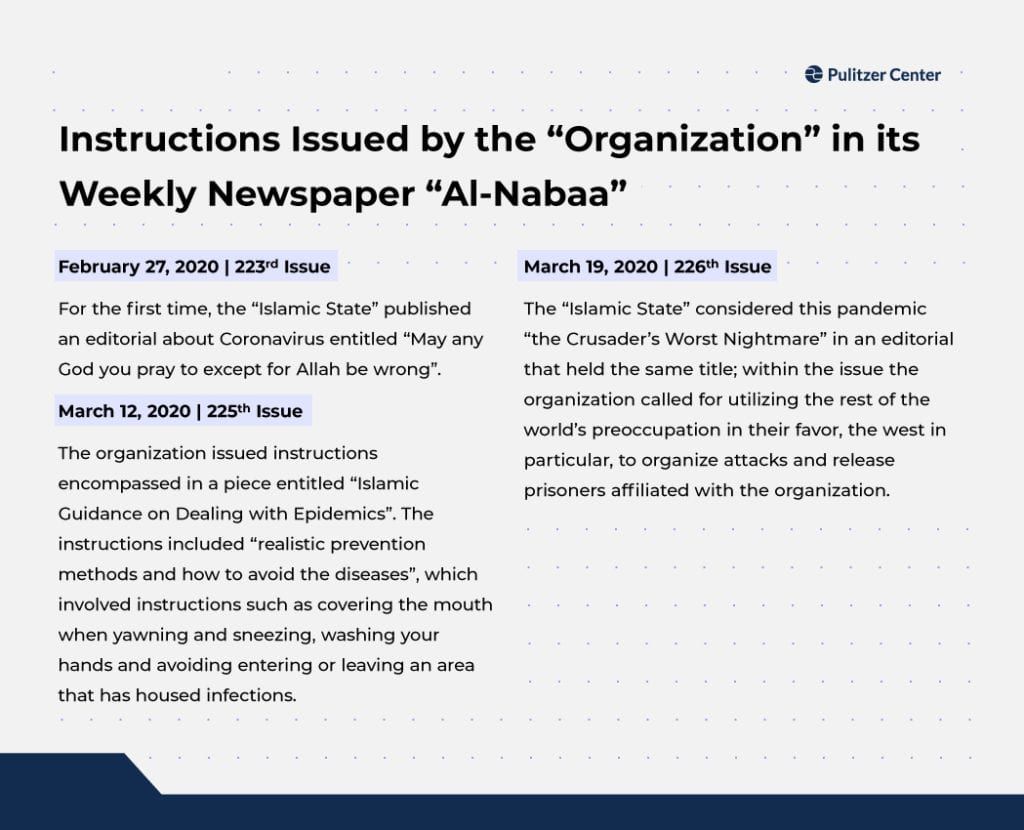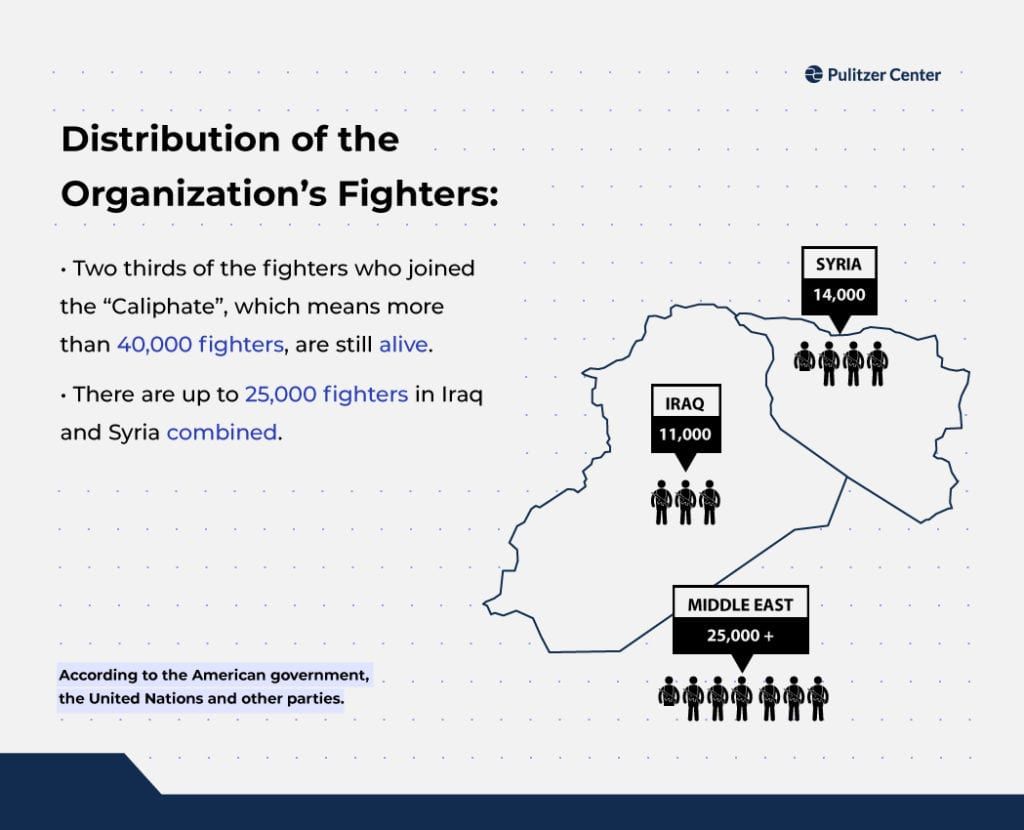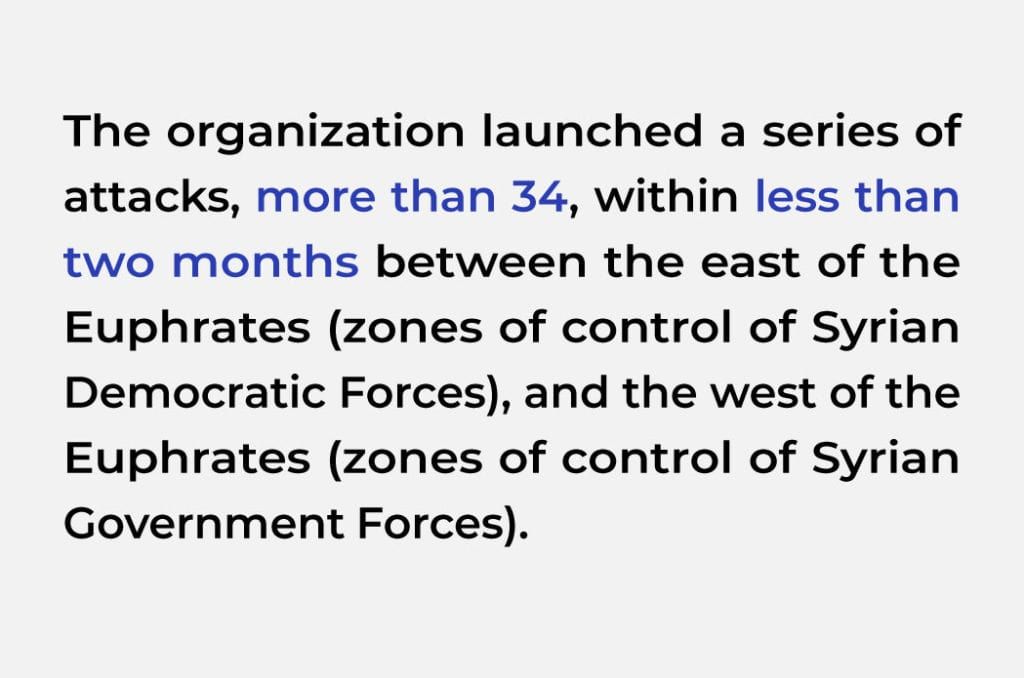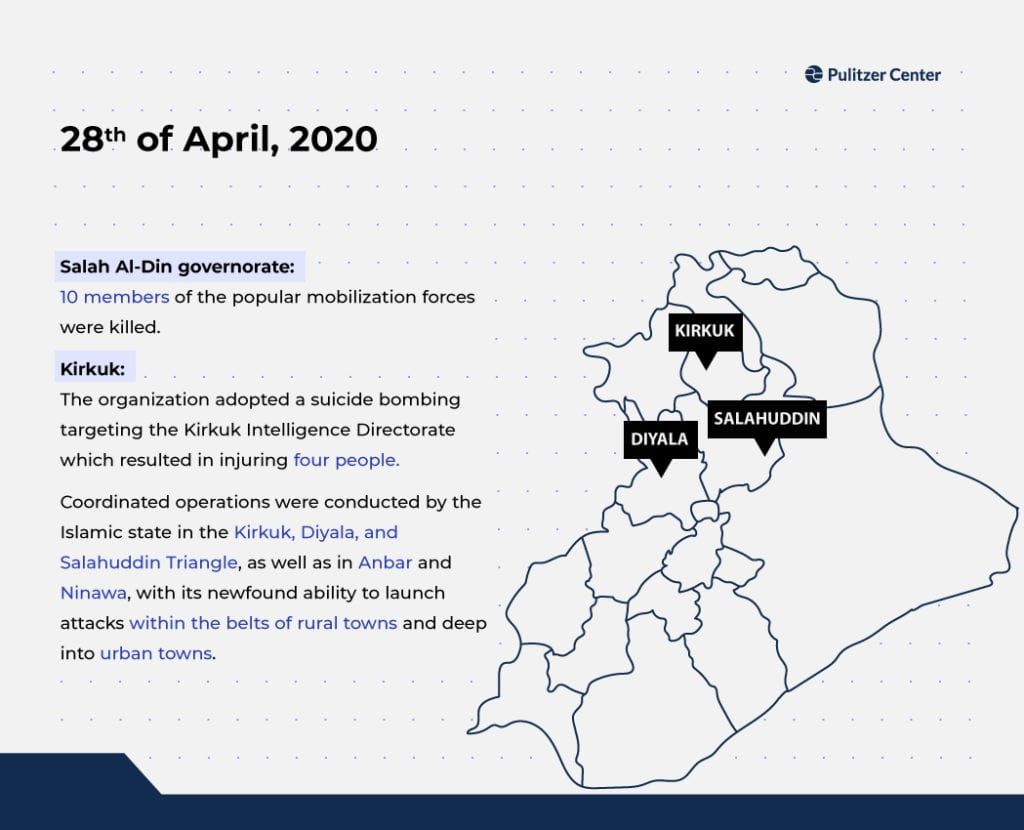Coronavirus’s arrival to the Middle East has offered the most prominent representations of “global jihadism”—the Islamic State and Al-Qaeda—an optimal and rare chance to take advantage of the pandemic in hopes of their revival; this is in light of a global shift in priorities, from terrorist security threats to preserving public health and restarting the global economic system.
Global jihadism has been suffering from practical challenges related to the structural and financial re-adaptation as well as the activation of the marketing, attracting, and recruiting processes necessary to continue expanding, spreading and executing attacks. Now however, global jihadism has the opportunity to exploit the chaos, while the war against terrorism was demoted to a third place priority.
The way global jihadism has responded to the coronavirus pandemic reveals the superiority of the Islamic State organization (ISIS) over Al-Qaeda, through all theoretical and practical levels, reflecting the rise of ISIS approach and the decline of the Al-Qaeda approach, which had already been crystal clear since 2013.
The way Al-Qaeda responded to the pandemic merely encompassed the broadcasting of propaganda and the implementation of limited attacks. The general command of the central Al-Qaeda organization in Afghanistan published a statement on March 31, 2020, entitled “The Way out of the Belly of the Whale: Commandments and Disclosures About the Coronavirus Pandemic,” which included traditional discourse about Islamic excellence in dealing with pandemics, and naturally considered the coronavirus a divine punishment. Al-Qaeda didn’t call on its followers to implement any terrorist operations, and the response spanned over its various branches was similar, although they did carry out limited attacks, especially "Jama’at Nusrat al-Islam wal-Muslimin" in Mali, "Haraket al-Shabaab al-Mujahideen" (Youth Movement) in Somalia, and "Al-Qaeda in the Arabian Peninsula" in Yemen.
The Islamic State outdid itself when dealing with the coronavirus, adapting speedily to the deepening health crisis due to the virus within a small time frame, as well as managing to turn the plight of the pandemic into an opportunity.
From the very beginning, the organization took strict measurements and issued obligatory instructions to its fighters. Those instructions were followed by a series of severe attacks in various states through different countries. Furthermore, the Islamic State was able to deal with the pandemic cautiously with obviously categorized steps. On February 27, 2020, the organization’s weekly newspaper, Al-Nabaa, published an editorial entitled “May Any God You Pray to Except for Allah Be Wrong,” about coronavirus for the first time in its 223rd issue.
Soon after, on March 12, 2020, the organization issued instructions encompassed in a piece entitled “Islamic Guidance on Dealing With Epidemics” in the 225th issue of Al Nabaa. The instructions included “realistic prevention methods and how to avoid the diseases," which involved instructions such as covering the mouth when yawning and sneezing, washing your hands, and avoiding entering or leaving an area that has housed infections.
In the 226th issue, published on March 19, 2020, the Islamic State considered this pandemic “the Crusader’s Worst Nightmare” in an editorial that held the same title; within the issue the organization called for utilizing the rest of the world’s preoccupation in their favor, the West in particular, to organize attacks and release prisoners affiliated with the organization.
Before the coronavirus pandemic, the Islamic State proved itself to be the most developed jihadi organization in terms of its cohesion of organizational structure and ideological solidity; it had reached a peak of development that was unfamiliar in historical global jihadism activity. It’s structure and ideology appear innovative in terms of their characteristics and strategies. Although the Islamic State was exiled from its urban control areas in Iraq and Syria, and lost its last bastion in Al-Bagouz in the Deir ez-Zor Governorate on March 23, 2018 to the Syrian Democratic Forces (supported by the Washington-led international coalition forces), it still retained great military, financial, and media-related capabilities. Since the fall of Al-Bagouz on March 19, 2020, the organization has claimed responsibility for more than 2000 attacks in Iraq and Syria.
Before the coronavirus pandemic, facts on the ground indicated the quick adaptation capabilities preserved by the Islamic State to field developments, and its great flexibility in shifting from a central approach to decentralization. The organization has managed to implement organizational restructuring at all the military, security, managerial, legislative, and media levels. By the end of the Caliphate state, their political project, the Islamic State, reverted back to being structured as an organization and to relying on its traditional combat tactics by depending on abrasion approaches and guerrilla warfare.
After the killing of Abu-Bakr al-Baghdadi on October 27, 2019, the new leader of the organization Abu-Ibrahim al-Hashimi al-Qurashi, whose real name is Amir Muhammad Sa’id Abd al-Rahman al-Mawla, proved to have the same canniness as al-Baghdadi once had. Al-Qurashi might have even outdone al-Baghdadi in several areas; he definitely boosted the capabilities of the organization, ensuring that al-Baghdadi’s death did not mean the death of the organization that has at its peak attracted almost 40,000 foreign fighters from 110 different countries.
The report of the UN monitoring group, which was completed by the end of December 2019, indicated that member states have concluded in their assessments that between half and two-thirds of the 40,000 fighters or more who joined the Caliphate are still alive. The American government, United Nations, and other parties confirmed that there remain about 25,000 fighters in Iraq and Syria: around 11,000 fighters in Iraq and 14,000 fighters in Syria, in addition to more than 25,000 active fighters in other branches all over the Middle East.
Conditions produced by the coronavirus form the perfect environment for radical movements. Not only did the Islamic State organization hurry to issue medical, ideological and communicative instructions regarding the coronavirus, but it also began to intensify its various attacks from the organization’s center in Iraq and its other branches all over the Middle East and other regions.
United Nations Secretary-General, António Guterres, warned on April 10, 2020, that “the pandemic poses a major threat to the maintenance of international peace and security, which will lead to more social unrest and violence that will seriously undermine our ability to fight against the disease." Guterres also warned that the extremist groups are likely to exploit the lockdown imposed to combat COVID-19 to spread hatred, as well as intensify their efforts on social media to recruit youth who are now spending more time on the internet.
The Iraqi Parliament’s Defense and Security Committee also warned on April 2, 2020, that the Islamic State may take advantage of the circumstances and the preoccupation of the Iraqi security forces with combating coronavirus. The committee’s report indicated that the organization had launched three successive attacks on the army and the People’s Mobilization Committee which resulted in multiple deaths and injuries in the Iraqi forces.
The report added that the organization is also exploiting the pandemic circumstances to move freely towards areas and villages in the big cities in northern and western Iraq.
The parliamentary Security and Defense Report confirmed that the Islamic State is attempting to make use of the coronavirus to free its prisoners, which is why the Iraqi authorities have tightened the guarding procedures for the facilities where that organization’s elements are imprisoned. The report also indicated that the organization’s members are attempting to return to the cities, especially in Mosul, in the west of the country, during the time when the emigrants are busy and afraid that the epidemic would reach their camps. The Iraqi Ministry of Defense also declared that the organization has been intensifying its attacks recently. In a statement issued on April 28, 2020, Iraqi security forces reported that ten members of the popular mobilization forces were killed in an attack launched by the Islamic State in the Salah Al-Din governorate, north of the Iraqi capital in Baghdad.
The organization has also since adopted a suicide bombing targeting the Kirkuk Intelligence Directorate on April 28, 2020, which resulted in injuring four people. Coordinated operations were conducted by the Islamic state in the Kirkuk, Diyala, and Salahuddin Triangle, as well as in Anbar and Ninawa, with its newfound ability to launch attacks within the belts of rural towns and deep into urban towns.
The coronavirus pandemic brought an end to the fight against terrorism, which has contributed to reviving the Islamic State in Iraq. On March 19, 2020, the Training Mission of the International Alliance and NATO suspended military operations for two months because of the coronavirus outbreak.
On March 29, Australia, Spain, France, the United Kingdom, New Zealand, Portugal and the Netherlands withdrew almost all of their trainers. The United States withdrew from its forward operations bases in Mosul, Al-Qaem, Al-Qayara and Kirkuk, and most of the U.S. forces were redeployed to a lower number of bases in Iraq, which are better protected, like Al-Asad base and Erbil airport, in the background of the conflict between Iran and the militias allied to it in Iraq. The Islamic State has intensified its attacks in Iraq, trying to capitalize on Baghdad’s accumulated crises: the U.S.-Iran escalation, decreasing oil prices, nationwide protests, and the poor interaction of the Iraqi armed forces in fighting ISIS and coronavirus.
Despite the rise in attacks by the Islamic State in Iraq, concern in Syria is growing, as attacks by the Islamic State have been increasing significantly, with more than 34 attacks carried out in less than two months between the eastern Euphrates (areas controlled by the Syrian Democratic Forces) and the western Euphrates (areas controlled by the Syrian government forces, namely in eastern Homs, southern Deir al-Zour and areas south of Raqqa province). It mainly targeted the Damascus/ Deir al-Zour road, one of the most important supply lines for the regime forces in eastern Syria. The organization’s attacks also included the border strip between Syria and Iraq near the Syrian city of Al-Bukamal and the Iraqi city of Al-Qaem.
On May 7, 2020, 11 members of the Syrian regime and its armed allies were killed in an attack by ISIS in the Syrian Desert (the Badia). On April 9, 2020, 27 members of the regime’s forces and its armed allies were killed during clashes with ISIS, which launched a sudden attack on military posts in the desert of the city of Sokhna. There are fears that the organization could release thousands of its fighters in local prisons and tens of thousands of its supporters in the refugee camps spread in the northeast, as attempts of rebellion of the ISIS prisoners in Geweran Prison in Al-Hasakah are increasing.
The Islamic State in Sinai has been making use of the COVID-19 conditions by intensifying its attacks in the Egyptian region. On May 1, 2020, the organization targeted a vehicle belonging to the Egyptian army in northern Sinai, and 10 people were killed and injured. An Egyptian military spokesperson said that an explosive device exploded in an armored vehicle south of Be’er Al-Abd city, killing an officer, another non-commissioned officer, and eight soldiers.
Africa seems like a promising space for the Islamic State in the time of coronavirus, as it has intensified its attacks in West Africa, the Sahel, and Somalia, East Africa, with the West African branch carrying out a series of bloody attacks in Borno, in the northeast of Nigeria, around Chad lake, where dozens were killed and hundreds were injured. Their Central Africa State branch launched violent attacks between Niger, Mali and Burkina Faso to the Gulf of Guinea. This was evident through the operation that targeted 25 soldiers from Niger on March 19, 2020, as well as targeted French forces and Malian security elements one day before.
The organization expanded and launched attacks in Mozambique on April 7, killing about 52 villagers in a disturbed region in the far north of the country. They also seized the strategic port of Musembua da Praia for a short period on March 24, and then seized another important town, Kisangani, two days later.
In Afghanistan in the state of Khurasan, the Islamic State’s stronghold in South Asia, ISIS has intensified its attacks, despite facing a difficult year after the U.S.-Taliban agreement, ending with the elimination of its base in Nangarhar. Yet the organization redeployed its military forces, which amount to about 2,500 elements, most of them now stationed in Konar. They launched an attack in the Afghan capital Kabul on March 5, 2020, killing 29 people and injuring 61, during a celebration in which a number of Afghan leaders and politicians participated. Among them was the presidential candidate Abdullah Abdullah. On March 25, the organization announced their responsibility for an attack on a Sikh temple in Kabul, killing 25, as well as a bombing at Bagram Air Base, the largest U.S. base in Afghanistan.
On April 17, 2020, a month after Philippine President Rodrigo Duterte imposed quarantine measures, the Islamic State of Southeast Asia launched an attack whereby gunmen linked to the organization opened fire on a military convoy in the remote province of Solo. 11 soldiers were killed in the ambush, as they were trying to carry out an operation against the organization’s leader in the Philippines. This ambush was one of several attacks by the Islamic State, including when in April, two other attacks were launched in countries whose governments had not officially reported attacks by the organization previously. The Islamic State also claimed responsibility for setting fire to some boats in the Maldives.
The Islamic State’s rapid response to the coronavirus, which is based on its long experience of exploiting objective political, economic, and social imbalances, has added to its belt a new experience in dealing with exceptional health conditions. The organization has long been a reflection of the failure of local, authoritarian “national state” policies, poor management of sectarian and ethnic divisions, political and ideological differences, weak governance, and the perils of external imperial interventions.
The political, economic, and security situation in the Middle East remains fragile and unstable. In most of the countries where the organization is active, particularly at its headquarters in Iraq and Syria, local official forces lack the competence and resources to pursue elements of the Islamic State within its transformation into its attrition and guerrilla tactics. Weak stability, a decline in reconstruction processes, poor governance, the dominance of corruption, widespread authoritarianism, and rampant sectarianism are more than enough factors to enhance the re-emergence of the Islamic State.
In a region exhausted by external intervention and a regional and global power conflict, the coronavirus pandemic has presented itself as an additional gift for the re-establishment of the Islamic State, amid doubts about the future role of the international alliance’s mission in the Middle East. International efforts to prevent the return of the Islamic State seem more vital than ever during the coming period. Everyone agrees that the war on terror should continue without being affected by any circumstances, coronavirus or otherwise, as the organization will make use of any loopholes that ensure its return, as it has in the past.
COVID-19 Update: The connection between local and global issues–the Pulitzer Center's long standing mantra–has, sadly, never been more evident. We are uniquely positioned to serve the journalists, news media organizations, schools and universities we partner with by continuing to advance our core mission: enabling great journalism and education about underreported and systemic issues that resonate now–and continue to have relevance in times ahead. We believe that this is a moment for decisive action. Learn more about the steps we are taking.
